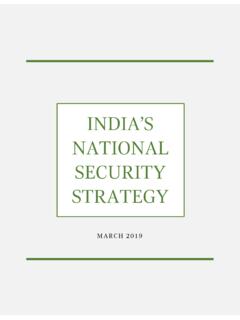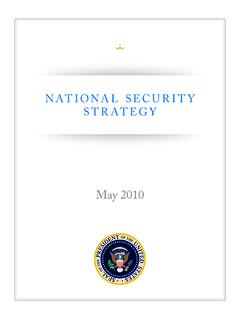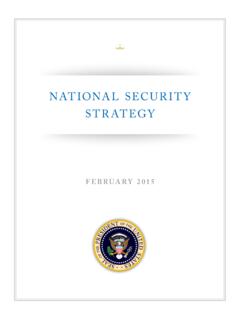Transcription of National Security Policy and Strategy - Ethiopian Legal Brief
1 THE FEDERAL DEMOCRATIC. REPUBLIC OF ETHIOPIA. FOREIGN AFFAIRS AND National . Security . Policy AND Strategy . Ministry of Information Press & Audiovisual Department November 2002. Addis Ababa Table of Contents Page 1. Section 1: Basic Principles 1. The Foundation of Foreign Affairs and National Security Policy .. 5. Development and the building of a democratic system as a basis for Policy .. 5. National pride and prestige as a basis for .. 9. Globalization as a basis for Policy ..19. 2. Objectives of the Foreign Affairs and National Security Policy .. 23. 3. The Foreign Affairs and National Security 25. Devoting the prime focus to activities at home .. 25. Strategy centered on the economy .. 28. Full utilization of benefits based on proper 30. Minimizing threats on the basis of proper analysis.
2 32. Reducing vulnerability to 34. Building a reliable defence capability ..40. a) Capacity building on the basis of a thorough threat 42. b) Building capacity by focusing on manpower development .. 43. c) Cost-effective use of financial resources ..46. d) Ensuring symibiotic linkage between defence expenditure and the economy .. 47. e) Building capacity in the context of economic development and current threats .. 48. Building strong implementation 49. a) Forging National 50. b) Strengthening the professional diplomatic 52. c) Coordinating and involving those with a role in 53. Section 2: Ethiopia's Relations with Other Countries 1. Countries of the Horn of 56. General .. 56. a) Significance of neighboring countries to the development of 57. b) Significance of neighboring countries to the democratization of Ethiopia.
3 59. c) The impact of Ethiopia's development and democratization on neighboring countries .. 60. Ethiopia's Policy towards 63. a) Significance of the 64. b) The Ruling Group, an obstacle to friendly relations 65. c) Policy direction .. 69. Ethiopia's Policy towards 73. a) Historical background of relations .. 73. b) Significance of the 75. c) Policy 77. Ethiopia's Policy towards The Sudan .. 82. a) Historical background of Ethio-Sudan Relations .. 82. b) Significance of the 86. c) Policy 87. Ethiopia's Policy towards Djibouti .. 91. a) Historical background of relations .. 91. b) Significance of the relations .. 92. c) Problems regarding the 93. d) Policy 96. Ethiopia's Policy towards 99. a) Historical background of the 99. b) Significance of the relations .. 100. c) Problems in the 102.
4 D) Policy 103. Strengthening the IGAD .. 105. 2. Relations With Other African Countries .. 106. Historical background of the relations .. 106. Significance of the relations .. 107. Policy 110. 3. Relations with Countries of the Middle 111. 111. Relations with 117. a) Historical background and problems regarding the relations .. 117. b) Significance of the c) Policy direction .. 125. Relations with Arabian Peninsula Countries .. 129. a) Historical background and problems in the relations .. 129. b) Significance of the relations .. 130. c) Policy 131. Relations with North African Countries .. 132. Relations with Israel .. 133. Relations with Turkey and Iran .. 136. 4. 137. The European Union (EU).. 137. The Russian 143. 5. Relations with the United States ( ) .. 144. 6.
5 Asia .. 148. General .. 148. Japan ..150. China .. 151. India .. 152. 7. International and non-governmental 154. International organizations .. 154. International non-governmental 155. Introduction There can be no doubt that the attainment of speedy economic development, democratization and peace is fundamental to the survival of our country which finds itself in a state of abject poverty and backwardness. That is why the Government gives priority to matters that are key to our survival and well-being. Unless the overall Policy direction pursued by the Government takes this basic reality into account, our National existence and Security will face grave danger. In this respect it is clear to see that our foreign relations and National Security Policy and Strategy can only have relevance if it contributes to the fight against poverty and promotes speedy economic development, democracy and peace.
6 If we do not realize our goals, one can predict that our country will be exposed to great instability and even collapse and our very Security , and indeed survival, will be at stake. Former governments pursued external relations and National Security policies that disregarded internal problems that were fundamental to our National condition. Rather, the effort was to focus on the outside world and to look in from the outside, as it were. Such an approach could not adequately protect our National interest and Security . There is no point in trying to pursue a foreign relations and National Security Policy to be implemented externally without a major and effective in-country effort to realize our vision of development and democratization. It should also be noted that the foreign policies of past governments were, in part, founded on a `siege mentality' which considered the country to be surrounded by enemies.
7 Its effects on the psychology of the people and its adverse impact on our relations with the outside world cannot be underestimated. This is, however, not to say that the country does not have external enemies or that all past policies directed against those who were arrayed against the country were wrong. What is essential is the necessity to carry out appropriate studies and assessments to distinguish between those whose interests would be negatively affected by our development and democratization efforts, and those who mistakenly believe that their interests would be negatively affected in this way. It would subsequently be proper to pursue a Policy and Strategy that would reduce the dangers and threats while ensuring that speedy economic development and democratization process.
8 Generally speaking, it could be said that the foreign relations and Security Policy implemented by former Ethiopian governments did not adequately take into account the impact that our internal problems and vulnerabilities had on our National Security and our very survival. Although, over the past twelve years, since the downfall of the Derg regime, it was theoretically understood that our National (domestic) policies were the basis of our foreign Policy , and that we needed to concentrate on development, it is difficult to conclude that we had a common understanding regarding just how internal problems weighed on the prospects for our National survival. The demands of Security and survival have thus made it necessary to elaborate a foreign relations and National Security Policy that took our internal situation into proper account.
9 Not only is this new foreign and National Security Policy and Strategy drafted to protect our National interests and to ensure Ethiopia's survival as a country, but its basic thrust is designed to bring about a fundamental change of attitude regarding the essence of foreign relations and National Security . This is one step that opens a new chapter in the history of our country. The Policy and Strategy in the main revolve around how to create enabling conditions so that the people, step by step, benefit from rapid economic growth and democratization. In order to bring this about, the Policy and Strategy bases itself on the internal challenges and vulnerability to threats that have an influence on our survival, and its focus is on tasks that should be carried out within the country.
10 Our direction is to move from the internal to what is external, doing our homework first, thereby enabling us to identify our shortcomings. Our foreign relations and National Security Policy and Strategy are designed to address the gaps that need to be filled. The external environment is viewed from the prism of our National situation and condition, and this ensures that the Policy and Strategy have relevance to our National Security and survival. Ethiopia's Policy and Strategy On Foreign Affairs and National Security Section I. Basic Principles 1. The Foundations of Foreign Affairs and National Security Policy In a fundamental sense, Security Policy is a matter of ensuring National survival. The alpha and omega of Security is the ensuring of National survival. Other National Security issues may be raised only if National existence is ensured.











